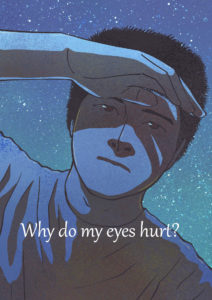Neo blinked, a dull pain pulsating through his skull. “Why do my eyes hurt?”
Morpheus leaned in. “You have never used them before.”
This was a simple yet profound moment in the mind-shifting 1999 sci-fi classic movie The Matrix… and it’s a conversation every student should have with their teacher on their journey of transformation.
Why do my eyes hurt?
In his late-20s, Neo believed he was living life as well as anyone else. He had a job, an apartment, and a social life. So when he discovered he had actually spent his life sealed in a pod—being fed virtual reality signals by an army of artificially intelligent machines—everything shifted.
But Neo didn’t make the discovery on his own. His revelation only came because someone pulled his body from the machinery and forced him to open his eyes. Of course, it was too much to take in all at once. But as he lay on the table, squinting into the light, he asked the inevitable question, “Why do my eyes hurt?” Morpheus’ veiled response, “You have never used them before,” sparked both answer and mystery. The response, while succinct, only produced a seed of understanding. Actual understanding was yet to come.*
About a year or so after my husband went to Heaven, I started to feel like I was waking up from coma with amnesia. I wasn’t quite sure how I got where I was, and I didn’t recognize the world around me. It certainly didn’t help being in the midst of a world-wide pandemic that created a surreal reality challenging every aspect of “normal” like NO one had ever experienced. Everyone was in some level of chaos and confusion. Everyone handled it in a different way—because each person was impacted differently and tried to manage it the best they knew how based on their age, experience, mental ability, financial security, and level of support available to them.
If I was Neo in the story from the Matrix, my question would be, who am I? I remembered being a wife and mother, making excited plans with my dear husband to embrace a new adventure as we approached our retirement years. We knew our daughter would marry and star in her own future while we would become empty nesters.
My husbands devastating diagnosis, followed by more than five years of his debilitating decline that led to his surrender into the arms of Jesus changed everything. I thought I knew what to expect. Like too many people with no experience of loss, I could only imagine how it would be, based on what I read, or others told me. There’s no way to prepare for the emotional tsunami. I couldn’t comprehend the impact every aspect of my life would encounter when my soulmate and best friend was suddenly no longer there, and worse, never coming back.
Like Neo, when that initial wave of shock that put me in a fog like a coma began to lift, everything shifted. I wasn’t pulled off some machine, but somehow, I reached a turning point where my mind determined I could start seeing the reality around me again. Like Neo, it was time for me to start using my eyes and see my world. It was time to make meaningful change.
I struggled hard to make sense of my world. I didn’t recognize myself, my life, or anything. The people in my life changed. Yes, the pandemic was a big part. It imposed isolation, fear, and attempted to separate and mask to remove caring, touching and smiling. It tried to impose lockdowns, unrest, and divide people. The pandemic forced an alternate reality on the world and did its level best to disrupt every support beam our human nature relies on to thrive and prosper. People in my life were different because of the pandemic, and they were different because I was different.
I was never in this place before. Where that was is still a mystery. Actual understanding is still yet to come. Grief is a long and difficult journey. Widows experience the loss of their spouse in profound ways—impacting so many levels of our very existence. There are social, economic, identity, and intimacy repercussions. Even a very caring network of support can’t replace this one thing we had: a shared and equally vested interest in the outcome of each other’s lives.
The truth is, we can no more pull ourselves from our grief than Neo could remove himself from the machine. This level of grief and pain requires trusting the right people to come into the void and begin to provide life-giving support starting with the most urgent needs. This will vary from widow to widow. When we begin to emerge from the initial fog, our reaction is too much to take in all at once.
 It could be compared to someone who suffered a near death accident on life support in a hospital. In the beginning, the patient will need many levels of support and care. As they begin to heal, the feeding tube can be removed, the respirator can be exchanged for an oxygen mask, bandages can be changed, and stitches removed. After the cast comes off, physical therapy will be added to retrain the body and build strength. I’m sure you get the picture.
It could be compared to someone who suffered a near death accident on life support in a hospital. In the beginning, the patient will need many levels of support and care. As they begin to heal, the feeding tube can be removed, the respirator can be exchanged for an oxygen mask, bandages can be changed, and stitches removed. After the cast comes off, physical therapy will be added to retrain the body and build strength. I’m sure you get the picture.
Healing is a much harder and longer journey than I could ever imagine. Discovering who I am and where I belong is the most difficult challenge so far. Everything I knew shifted. Some things are gone. Finding the courage and strength to keep searching and trying new things takes faith and persistence. Building a network of support is very important… and a lot more complicated.
We’ve all been through a nightmare we never chose. May God give us the grace, courage and wisdom we need to keep pressing forward to not only deal with inevitable changes, but to find lasting peace and fulfilling purpose. May He place skilled and caring people in our lives to support and balance us so we can once again thrive. May He show us how to adjust to and use our new circumstances to our advantage to reach our desired destination, no matter how the winds of life blow.
*Hamp, Bob. Think Differently Learn Differently: Communication with Change in Mind (p. 4). Kindle Edition.
~~~~~~~~~~~~~~~~~~~~~~~~~~
**Have you heard about Hope for Widows Foundation’s annual Restoring Hope & Peace Grant program? It
was established by the organization in 2019 to help widowed women offset financial challenges as they navigate their healing journey. You can find out details, timeline and the history of this grant here: https://hopeforwidows.org/grant/ All widows based in U.S. and Canada are encouraged to apply. Applications open on National Widows Day, May 3, 2022. For additional questions feel free to email info@hopeforwidows.org **


